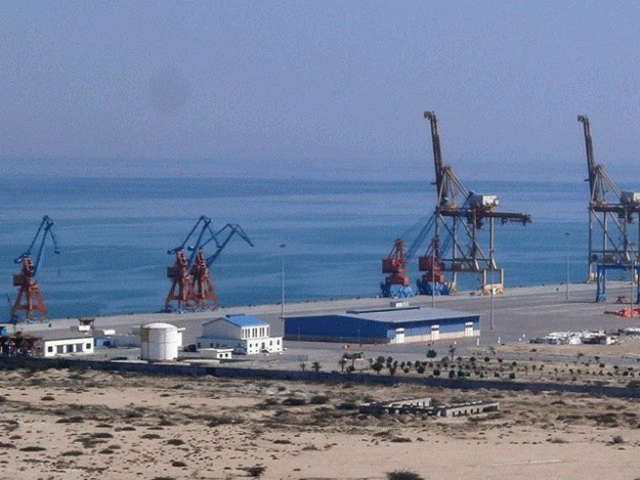Economic Corridor: Senate body seeks increase in allocation for western route
Committee members from Khyber-Pakhtunkhwa and Balochistan speak against earmarking meagre funds.

In the new budget, the government has set aside Rs20.3 billion for the western alignment, which is just 12% of the total CPEC allocations.PHOTO: AFP
A parliamentary committee on Thursday recommended to the government to increase the budgetary allocation for western route of the China-Pakistan Economic Corridor (CPEC) to Rs100 billion besides asking it to withdraw the increase in additional sales tax.
The proposals were unanimously made by the Senate Standing Committee on Finance and Revenue, which discussed the 2015-16 budget for the third consecutive day.
The committee also recommended to the government to allow import of up to five-year-old used cars – a move supported by the tax authorities.
The committee members, particularly belonging to Khyber-Pakhtunkhwa and Balochistan, spoke against a meagre allocation for the western route of the corridor.
In the new budget, the government has set aside Rs20.3 billion for the western alignment, which is just 12% of the total CPEC allocations.
“The Senate recommends that at least Rs100 billion should be allocated to the western corridor in line with the consensus decision of the All Parties Conference and the PM’s promise to build the western route on a priority basis,” said the proposal.
The mover of the proposal, Senator Farhatullah Babar, said the government had tried to deceive parliament by not mentioning the name of eastern corridor in budget documents, but allocated 60% of the CPEC funds for eastern route projects. “It is nothing but political fudging,” said Babar.
The committee decided to seek a presentation from the Ministry of Planning besides deciding to hold an inquiry to uncover the characters behind attempts to conceal the eastern alignment projects.
Extra GST
The committee also recommended a reduction in the 2% extra general sales tax (GST) above the standard 17% GST, proposed to be charged from unregistered persons.
In the last budget, the government had re-introduced 1% additional GST to be charged from persons not registered with the Federal Board of Revenue (FBR), taking the total GST to 18%. It collected Rs11 billion by imposing the 1% extra tax this fiscal year.
In the new budget, the government has proposed to increase the rate to 2%, taking the levy to 19%. However, the committee insisted on keeping the extra tax at 1%. The FBR has estimated additional revenue of Rs8 billion with the increase in the tax rate.
At present, less than 100,000 people are registered sales tax payers, though millions are doing the wholesale and retail business.
The FBR is punishing the manufacturers for its own failure to register the people, said Senator Ilyas Bilour.
Bilour, who himself is a manufacturer, said the unregistered persons refused to pay 1% extra tax and the manufacturers are paying this from their pockets to keep their business running.
The FBR chairman admitted that the 1% extra tax did not help in broadening the sales tax base but was adamant that the rate increase will achieve the desired results.
It is not the only case where the FBR is punishing people for its follies, as it has slapped 0.6% tax on every banking transaction in the name of broadening the tax base.
Car imports
The committee also recommended that the age limit of used imported cars should be enhanced from three to five years.
FBR Chairman Tariq Bajwa backed the proposal. In the tenure of the PPP, the influential car assemblers had managed to get the age limit reduced from five to three years.
The current government is also under pressure from the same lobby and has withheld the approval of the automobile policy for the last over one year, said sources in the FBR.
Published in The Express Tribune, June 12th, 2015.
Like Business on Facebook, follow @TribuneBiz on Twitter to stay informed and join in the conversation.



















COMMENTS
Comments are moderated and generally will be posted if they are on-topic and not abusive.
For more information, please see our Comments FAQ